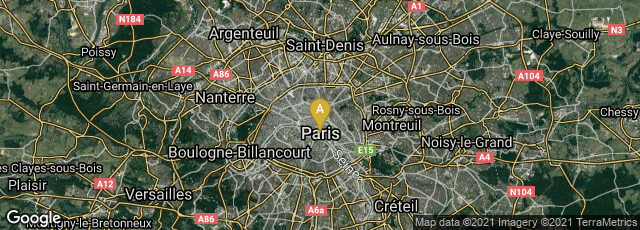

A: Paris, Île-de-France, France
Though the convening of the Estates-General by royal edict dated January 23, 1789 may be the official beginning of the French Revolution, the revolution formally began on July 14, 1789. Why did it happen?
Among the major causes were economic and fiscal crises of the Ancien Régime. In particular poor harvests and the rising price of food made life increasingly intolerable for the poor. At the same time the isolation of the royal court at Versailles made the court largely unresponsive to the crisis. In addition, Englightenment ideals, which had developed during the second half of the eighteenth century, created aspirations for social change, and resentments toward the Ancien Régime.
"The economy was not healthy; poor harvests, rising food prices, and an inadequate transportation system made food even more expensive. The sequence of events leading to the revolution involved the national government's virtual bankruptcy due to its poor tax system and the mounting debts caused by numerous large wars. The attempt to challenge British naval and commercial power in the Seven Years' War was a costly disaster, with the loss of France's colonial possessions in continental North America and the destruction of the French Navy. French forces were rebuilt and performed more successfully in the American Revolutionary War, but only at massive additional cost, and with no real gains for France except the knowledge that Britain had been humbled. France's inefficient and antiquated financial system could not finance this debt. Faced with a financial crisis, the king called an Assembly of Notables in 1787 for the first time in over a century.
"Meanwhile, the royal court at Versailles was isolated from, and indifferent to the escalating crisis. While in theory King Louis XVI was an absolute monarch, in practice he was often indecisive and known to back down when faced with strong opposition. While he did reduce government expenditures, opponents in the parlements successfully thwarted his attempts at enacting much needed reforms. Those who were opposed to Louis' policies further undermined royal authority by distributing pamphlets (often reporting false or exaggerated information) that criticized the government and its officials, stirring up public opinion against the monarchy.
"Many other factors involved resentments and aspirations given focus by the rise of Enlightenment ideals. These included resentment of royal absolutism; resentment by peasants, laborers and the bourgeoisietoward the traditional seigneurial privileges possessed by the nobility; resentment of the Catholic Church's influence over public policy and institutions; aspirations for freedom of religion; resentment of aristocratic bishops by the poorer rural clergy; aspirations for social, political and economic equality, and (especially as the Revolution progressed) republicanism; hatred of Queen Marie-Antoinette, who was falsely accused of being a spendthrift and an Austrian spy; and anger toward the King for firing finance minister Jacques Necker, among others, who were popularly seen as representatives of the people" (Wikipedia article French Revolution, accessed 03-08-2014).